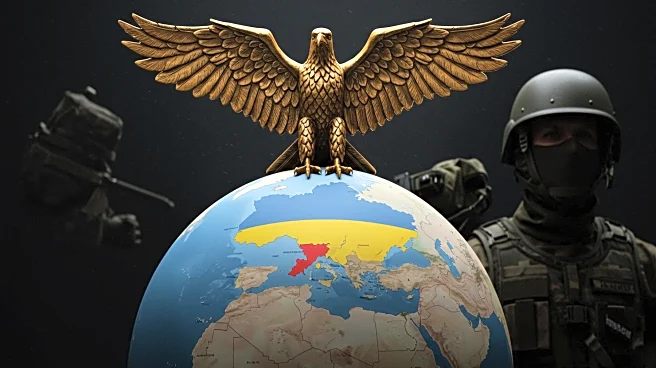What's Happening?
European leaders have expressed approval of President Trump's decision to allow U.S. military support for a European-led peacekeeping force in Ukraine. This development is seen as a significant boost to the operation's potential success. The coalition, comprising around 30 countries, aims to establish a 'reassurance force' to maintain peace in Ukraine. While President Trump has not publicly confirmed the specifics of U.S. involvement, the presence of U.S. airpower or military equipment is considered crucial. The operation's effectiveness relies on the deterrent power of U.S. military support, which European forces lack in sufficient quantity. The initiative, known as Multinational Force Ukraine, is designed to strengthen Ukraine's defenses against potential Russian aggression. European leaders, including French President Emmanuel Macron, have emphasized the importance of U.S. participation, although NATO will not be involved in the security guarantees.
Why It's Important?
The U.S. backing of the European peace force is pivotal for the operation's credibility and deterrence capability. The involvement of U.S. military resources could dissuade Russian forces from challenging the peacekeeping efforts, thereby enhancing regional stability. This move also reflects a shift in the U.S. approach to European security, encouraging Europe to take more responsibility for its defense while still providing critical support. The decision could influence the dynamics of U.S.-Russia relations, as it comes ahead of President Trump's summit with Russian President Vladimir Putin. The success of this initiative could set a precedent for future U.S.-European military collaborations, impacting NATO's role and the broader geopolitical landscape.
What's Next?
The next steps involve finalizing the details of U.S. military support and coordinating with European allies to deploy the peace force effectively. The force's headquarters will initially be in Paris, moving to London next year, with a coordination center in Kyiv once hostilities cease. The coalition will continue to work on securing Ukraine's airspace and maritime areas, particularly in the Black Sea. The involvement of U.S. Vice President JD Vance in coalition meetings suggests ongoing high-level U.S. engagement. However, the exact contributions from the U.S. remain unspecified, and President Trump's past unpredictability leaves some uncertainty about the final outcome.
Beyond the Headlines
The establishment of a European-led peace force with U.S. support highlights the evolving nature of transatlantic security cooperation. It underscores the strategic importance of Ukraine in European security and the broader implications for NATO's future role. The initiative also raises questions about the balance of power in Europe and the potential for increased European military autonomy. The reluctance of some European countries, like Greece and Italy, to contribute troops reflects internal divisions and the complexity of achieving consensus on security matters. The operation's success could influence future U.S. foreign policy decisions and the global perception of American military commitments.









